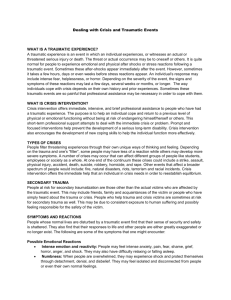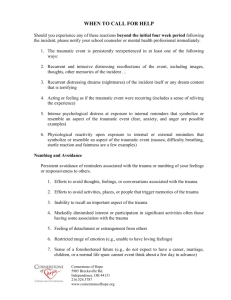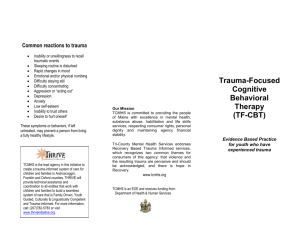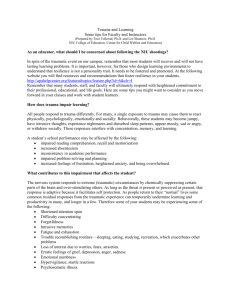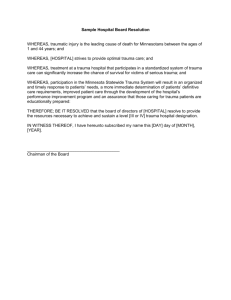W -R S R
advertisement
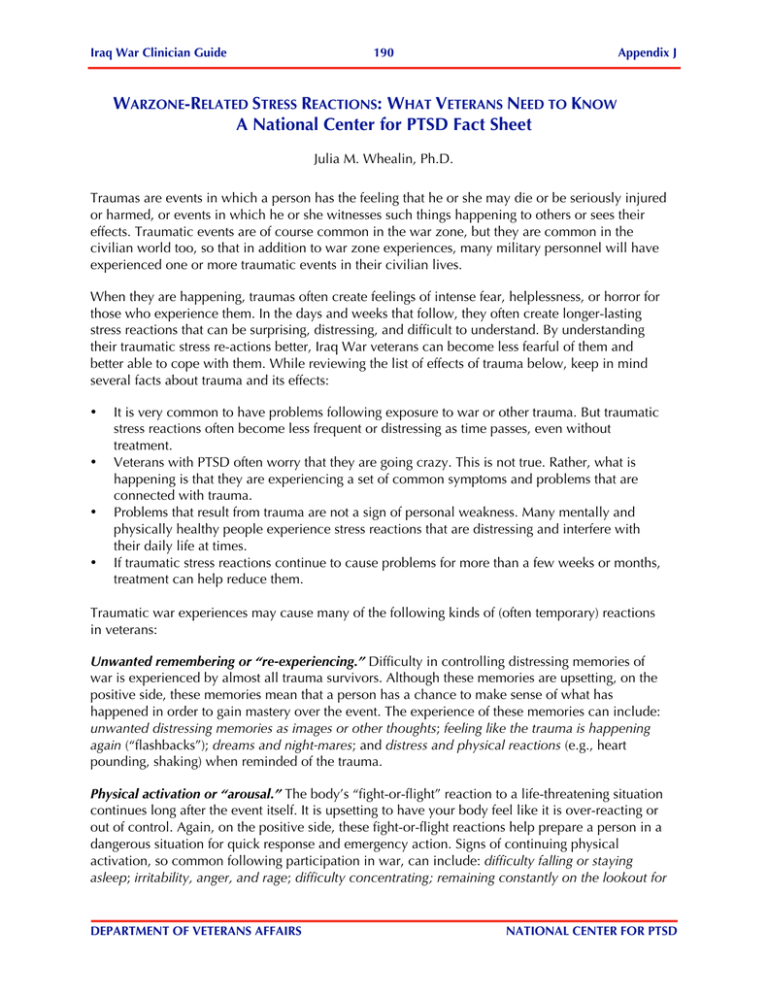
Iraq War Clinician Guide 190 Appendix J WARZONE-RELATED STRESS REACTIONS: WHAT VETERANS NEED TO KNOW A National Center for PTSD Fact Sheet Julia M. Whealin, Ph.D. Traumas are events in which a person has the feeling that he or she may die or be seriously injured or harmed, or events in which he or she witnesses such things happening to others or sees their effects. Traumatic events are of course common in the war zone, but they are common in the civilian world too, so that in addition to war zone experiences, many military personnel will have experienced one or more traumatic events in their civilian lives. When they are happening, traumas often create feelings of intense fear, helplessness, or horror for those who experience them. In the days and weeks that follow, they often create longer-lasting stress reactions that can be surprising, distressing, and difficult to understand. By understanding their traumatic stress re-actions better, Iraq War veterans can become less fearful of them and better able to cope with them. While reviewing the list of effects of trauma below, keep in mind several facts about trauma and its effects: • • • • It is very common to have problems following exposure to war or other trauma. But traumatic stress reactions often become less frequent or distressing as time passes, even without treatment. Veterans with PTSD often worry that they are going crazy. This is not true. Rather, what is happening is that they are experiencing a set of common symptoms and problems that are connected with trauma. Problems that result from trauma are not a sign of personal weakness. Many mentally and physically healthy people experience stress reactions that are distressing and interfere with their daily life at times. If traumatic stress reactions continue to cause problems for more than a few weeks or months, treatment can help reduce them. Traumatic war experiences may cause many of the following kinds of (often temporary) reactions in veterans: Unwanted remembering or “re-experiencing.” Difficulty in controlling distressing memories of war is experienced by almost all trauma survivors. Although these memories are upsetting, on the positive side, these memories mean that a person has a chance to make sense of what has happened in order to gain mastery over the event. The experience of these memories can include: unwanted distressing memories as images or other thoughts; feeling like the trauma is happening again (“flashbacks”); dreams and night-mares; and distress and physical reactions (e.g., heart pounding, shaking) when reminded of the trauma. Physical activation or “arousal.” The body’s “fight-or-flight” reaction to a life-threatening situation continues long after the event itself. It is upsetting to have your body feel like it is over-reacting or out of control. Again, on the positive side, these fight-or-flight reactions help prepare a person in a dangerous situation for quick response and emergency action. Signs of continuing physical activation, so common following participation in war, can include: difficulty falling or staying asleep; irritability, anger, and rage; difficulty concentrating; remaining constantly on the lookout for DEPARTMENT OF VETERANS AFFAIRS NATIONAL CENTER FOR PTSD Iraq War Clinician Guide 191 Appendix J danger (“hypervigilance”); being startled easily, for example, when hearing a loud noise (“exaggerated startle response”); and anxiety and panic. Shutting down: Emotional numbing. When overwhelmed by strong emotions, the body and mind sometimes react by shutting down and becoming numb. The veteran may, as a result, have difficulty in experiencing loving feelings or feeling some emotions, especially when upset by traumatic memories. Like many of the other reactions to trauma, this emotional numbing reaction is not something the veteran is doing on purpose. Active avoidance of trauma-related thoughts and feelings. Painful memories and physical sensations of fear and activation can be frightening, so it is only natural to try and find ways to prevent them from happening. One way that most veterans try is to avoid anything – people, places, conversations, thoughts, emotions and feelings, physical sensations – that might act as a reminder of the trauma. This can be very helpful if it is used once in a while (e.g., avoiding upsetting news or television programs). But when it is used too much it can have two big negative effects. First, avoidance can reduce veterans’ abilities to live their lives and enjoy themselves, because they can become isolated and limited in where they can go and what they can do. Second, avoiding thinking and feeling emotions connected with the trauma may reduce veterans’ abilities to recover from it. It is through thinking about what happened, and particularly through talking about it with trusted others, that survivors may best deal with what has happened. By constantly avoiding thoughts, feelings, and discussions about the trauma, this potentially helpful process can be short-circuited. Depression. Most persons who have been traumatized experience depression. Feelings of depression then lead a person to think very negatively and feel hopeless. There is a sense of having lost things: one’s previous self (“I’m not the same person I was”), sense of optimism and hope, selfesteem, and self-confidence. With time, and sometimes with the help of counseling, the trauma survivor can regain self-esteem, self-confidence, and hope. It is important to let others know about feelings of depression, and of course about any suicidal thoughts and feelings that are sometimes part of feeling depressed. Self-blame, guilt, and shame. Many veterans, in trying to make sense of their traumatic war experiences, blame themselves or feel guilty in some way. They may feel bad about some thing(s) they did or didn’t do in the war zone. Feelings of guilt or self-blame cause much distress, and can prevent a person from reaching out for help. Therefore, even thought it is hard, it is very important to talk about guilt feelings with a counselor or doctor. Interpersonal effects. The many changes noted above can affect relationships with other people. Trauma may cause difficulties between a veteran and his or her partner, family, friends, or coworkers. The veteran who is experiencing high levels of irritability and anger may now have more conflicts with others and handle them less well. Particularly in close relationships, the emotional numbing and feelings of disconnection from others that are common after traumatic events may create distress and drive a wedge between the survivor and his or her family or close friends. Avoidance of different kinds of social activities by the survivor may frustrate family members. Sometimes, this avoidance results in social isolation that hurts relationships. Some kinds of traumatic experiences (e.g., sexual assault) can make it hard to trust other people. Friends and family may respond in ways that worsen the problem rather than help recovery. They may have difficulty understanding, become angry with the veteran, communicate poorly, and/or fail to provide support. DEPARTMENT OF VETERANS AFFAIRS NATIONAL CENTER FOR PTSD Iraq War Clinician Guide 192 Appendix J Becoming more aware of trauma reactions and how to cope with them can help survivors reduce the harm they cause to relationships. Just as the veteran needs to learn about trauma and its effects, so other people who are important to him or her will need to learn more. Partners and families need to participate in treatment. By learning more about traumatic stress, friends and family members can often become more understanding of the veteran and feel more able to help. Physical symptoms and health problems. Because many traumas result in physical injury, pain is often part of the experience of survivors. This physical pain often causes emotional distress, because in addition to the fact that it hurts, it also reminds them of their trauma. Because traumas stress the body, they can sometimes affect physical health, and stress-related physical symptoms (e.g., headaches, nausea, skin problems) may be experienced. The veteran with PTSD will need to care for his or her health, seek medical care when appropriate, and inform the doctor or nurse about his traumas, in order to limit the effects of the trauma. DEPARTMENT OF VETERANS AFFAIRS NATIONAL CENTER FOR PTSD
